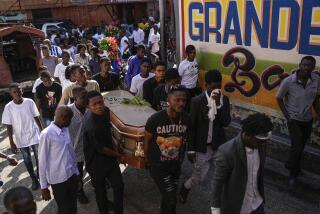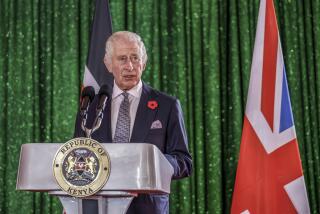Ghana Clans Prepare for Battle as the Slain King Awaits Burial
- Share via
YENDI, Ghana — It was terrible enough that the beloved king was murdered and his head paraded on a spear, causing his 32 widows to weep at the mere mention of his name.
Or that more than two years later, his headless body still languishes in a tiny hospital morgue.
The feud that killed the king of Dagbon has stoked havoc across the dust-blown fields of this northern Ghana kingdom. But family members say it’s nothing compared to the war of succession they anticipate once the king is finally buried.
For 600 years the Abudu and Andani clans -- named after two sons of the ancient Dagbon king -- cordially rotated control of the kingdom, centered in Yendi, 330 miles north of Accra, the capital.
Dagbon, half the size of Rhode Island with 1 million people, is one of eight traditional kingdoms in this West African republic.
A 30-year-old power struggle between the clans reignited in March 2002, when Abudu warriors brandishing spears, bows and arrows, and guns stormed the palace and slaughtered the 66-year-old Andani king, Ya-Na Yakubu, and 30 clan elders.
The sacred Dagbon palace -- two dozen mud huts inside a walled compound -- was raked with bullets and burned down. The king’s head and arm went missing but turned up a week later, placed by persons unknown in the palace ruins. They now lie beside the corpse.
Andani elders say the king can be buried when a nearly rebuilt new palace is complete, with a pavilion where he can lie in state.
They will then name a successor -- most likely a son.
But the Abudu contend that since the king is dead -- never mind that they killed him -- it’s their turn to appoint a successor.
That would likely be Mahamadu Abdulai, 20, the Abudu chief from Yendi. Residents say he was taken out of school and given three wives and a cadre of elders, who groom him for majesty.
One afternoon at the Abudu compound, the young chief sat sullen and silent in shiny green slippers and let one of his elders do the talking.
“It is the Abudu’s turn to take control of Dagbon,” said Alhassan Iddrisu, who wore the traditional head wraps signifying a king has fallen. “Or there could be trouble.”
Iddrisu said his clan had been bitter since 1974, when an Abudu king was ousted in disputed circumstances and the ill-fated Andani monarch took power.
Confidence runs high among the Abudu that the next reign will be theirs -- a hope bolstered, residents say, by the Abudu’s magic power, still feared across West Africa.
Outside the Abudu chief’s chamber, a large stone lay covered in chicken blood and feathers.
“When the Ya-Na is chosen,” Iddrisu said, “drums will sound across the land.”
As it is, tensions over the regicide are sending ripples across modern Ghana, a democracy trying to make its economic niche with high-tech call centers. Kings and chiefs have autonomy over their areas, but many find it hard to keep modern politics at bay.
A government commission charged with investigating the 2002 killings has achieved little more than to sow distrust. A tribunal charged with mediating the conflict has fared little better.
Government inaction has led many Andani to suspect the killings were political, engineered by Abudu members of President John Kufuor’s administration to seize the throne. Kufuor repeatedly denied any involvement.
During the fighting, which lasted three days, palace phone lines and electricity were cut.
The army never arrived, and the Yendi police stayed at their station, a stone’s throw from the sacked palace. In the heat of battle, the interior minister at the time -- an Abudu -- went on national radio to claim that Yendi was calm.
The Andani and Abudu have long lived and worked together, and even now a wary coexistence prevails. Passions are kept in check, perhaps, by the presence of government troops with weapons drawn, stationed outside the destroyed palace.
In Tamale, the regional capital, troops in armored personnel carriers patrol night and day.
Their palace destroyed, the late king’s 32 wives live in a concrete compound off Yendi’s main strip.
A dozen women were home one recent afternoon, cooking stews over charcoal and tending to the king’s many children.
“All we want is the government to find the perpetrators,” said Fati Mopaga, the king’s cousin, speaking for several widows seated in a front room. “Until that happens, we will stay here.”
Alhassan Andani, the late king’s brother, said the new palace is almost complete. The two sides are still haggling over the final touches, however, since each clan believes it will be its next occupant.
Once the decoration is done, and the slain king buried, the two sides are expected to openly name their rival claimants to the throne.
“There will be two kings in Dagbon, and that can bring many lost lives, much worse than before,” Andani said.
Although he prayed for a peaceful solution, he said, “everyone in Dagbon can be a warrior when the time comes.”
More to Read
Sign up for Essential California
The most important California stories and recommendations in your inbox every morning.
You may occasionally receive promotional content from the Los Angeles Times.












